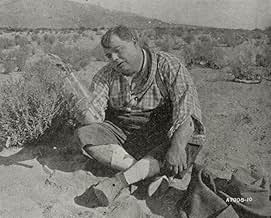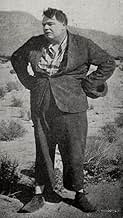IMDb RATING
6.4/10
1.3K
YOUR RATING
After escaping from a marauding group of Indians, a wandering bartender teams up with a saloon owner, only to find themselves up against a ruthless outlaw who is after an unprotected Salvati... Read allAfter escaping from a marauding group of Indians, a wandering bartender teams up with a saloon owner, only to find themselves up against a ruthless outlaw who is after an unprotected Salvation Army girl. Can they beat him at his own game?After escaping from a marauding group of Indians, a wandering bartender teams up with a saloon owner, only to find themselves up against a ruthless outlaw who is after an unprotected Salvation Army girl. Can they beat him at his own game?
- Director
- Writers
- Stars
- Director
- Writers
- All cast & crew
- Production, box office & more at IMDbPro
Featured reviews
Leaving NYC behind for the first time in their partnership, Arbuckle and Keaton turn a satirical eye to the wild west. Out here, amongst the dusty plains and ramshackle abodes, Fatty plays a penniless, train-hopping drifter who's chased into Buster's rowdy cowboy saloon. Taking a job as the barkeep (after a timely disposal of the bullet-riddled previous employee), Arbuckle quickly acclimates to the environment and encourages further chaos in an already out-of-control situation. Keaton doesn't seem to mind, so long as the bodies don't stack so high as to impede his liquor sales.
The change in scenery serves this duo well, inspiring a rush of fresh ideas and cinematic creativity. They're experimenting again, with a greater tendency to explore new locations. Where, in the past, they'd typically pick a room and sit in it, Out West sees them stealing lunch aboard a moving locomotive, exchanging fire with dim-witted outlaws on the street, raiding a kidnapper's home in search of a fair damsel and pouring alcohol into an over-served horse at the bar. Clearly, the horizon is expanding for this pair; they're testing their limits, beginning to appreciate the nuances and advantages of working on-screen, rather than on-stage. Maybe not their best collaboration so far, but it constantly hints at greater things to come.
The change in scenery serves this duo well, inspiring a rush of fresh ideas and cinematic creativity. They're experimenting again, with a greater tendency to explore new locations. Where, in the past, they'd typically pick a room and sit in it, Out West sees them stealing lunch aboard a moving locomotive, exchanging fire with dim-witted outlaws on the street, raiding a kidnapper's home in search of a fair damsel and pouring alcohol into an over-served horse at the bar. Clearly, the horizon is expanding for this pair; they're testing their limits, beginning to appreciate the nuances and advantages of working on-screen, rather than on-stage. Maybe not their best collaboration so far, but it constantly hints at greater things to come.
Much of the material in "Out West" works well, at least as long as you understand its intent. It combines some of the usual Arbuckle/Keaton slapstick with a satirical look at some of the conventions of the Western genre of its time, and it has a decent variety of scenes and settings.
The story starts off with some amusing antics by Arbuckle on a train, and then goes on from there as he meets up with the other characters. Keaton gets some good moments, and Arbuckle regular Al St. John has a funny role as a villainous gun-slinger.
They take some chances with some of the material, and it's easy to see how today's audiences could misinterpret it. There are a couple of morbid gags that work pretty well, but there are a couple of other things are just not at all funny now, even given that they were parodying the Westerns of the time.
Overall, it has some good moments that most fans of Arbuckle and Keaton would enjoy, but there are other parts of it that even their fans will probably find somewhat uncomfortable.
The story starts off with some amusing antics by Arbuckle on a train, and then goes on from there as he meets up with the other characters. Keaton gets some good moments, and Arbuckle regular Al St. John has a funny role as a villainous gun-slinger.
They take some chances with some of the material, and it's easy to see how today's audiences could misinterpret it. There are a couple of morbid gags that work pretty well, but there are a couple of other things are just not at all funny now, even given that they were parodying the Westerns of the time.
Overall, it has some good moments that most fans of Arbuckle and Keaton would enjoy, but there are other parts of it that even their fans will probably find somewhat uncomfortable.
The year 1918 became a very lucrative year for director/writer/actor comedian Roscoe Arbuckle. Receiving the rare opportunity to operate his own production studio under a major motion picture company's umbrella, Arbuckle, by his proven popularity, was able to renegotiate his contract with Paramount Pictures to one of the highest financial pacts in Hollywood at the time. He signed for three million dollars to make 18 two-reelers within three years, putting his salary in the stratosphere with the likes of Charlie Chaplin and Mary Pickford.
In late 1917, he transferred his Comique production team from New York City to California for better weather and a more diverse typography. He utilized the new environment to great use in his first film on the West Coast in January 1918's "Out West." Arbuckle constructed an entire Old Western town to serve as a backdrop to his and his surrounding cast's antics. He plays the town saloon's bartender while Buster Keaton is its sheriff and Al St. John serves as the bad guy, Wild Bill Hiccup.
"Out West's" story was composed by Keaton's future wife, Natalie Talmadge, who used every Western movie cliche to poke fun at the genre. From a train chase to a gang of mischievous baddies disturbing the town, "Out West" contains every element that made Westerns so popular for movie goers.
Criticism has been heaped on "Out West" for one particular insensitive scene where the only purpose is to introduce heroine Alice Lake, a Salvation Army worker, who stands up to the saloon's bullies against a defenseless African American. Otherwise, comedies on the Old West don't get any funnier than this movie and is on par with Mel Brooks "Blazing Saddles."
In late 1917, he transferred his Comique production team from New York City to California for better weather and a more diverse typography. He utilized the new environment to great use in his first film on the West Coast in January 1918's "Out West." Arbuckle constructed an entire Old Western town to serve as a backdrop to his and his surrounding cast's antics. He plays the town saloon's bartender while Buster Keaton is its sheriff and Al St. John serves as the bad guy, Wild Bill Hiccup.
"Out West's" story was composed by Keaton's future wife, Natalie Talmadge, who used every Western movie cliche to poke fun at the genre. From a train chase to a gang of mischievous baddies disturbing the town, "Out West" contains every element that made Westerns so popular for movie goers.
Criticism has been heaped on "Out West" for one particular insensitive scene where the only purpose is to introduce heroine Alice Lake, a Salvation Army worker, who stands up to the saloon's bullies against a defenseless African American. Otherwise, comedies on the Old West don't get any funnier than this movie and is on par with Mel Brooks "Blazing Saddles."
7tavm
This short silent comedy starring Roscoe "Fatty" Arbuckle with Buster Keaton and Al St. John in support is a mixed bag as a spoof of westerns. In begins on a train where Arbuckle ingeniously steals some food from three men one of whom was Buster's father, Joseph. After being thrown off and getting chased by Indians (or in today's parlance, Native Americans), Roscoe stumbles into the town saloon where he foils robber St. John's holdup and takes his guns. This is when he and Buster meet and become teaming acquaintances. There are many very funny gags up to this point to where they tickle St. John victoriously but then there's a racist gag involving one Ernie Morrison Sr. (the father of original "Our Gang"s Ernie "Sunshine Sammy" Morrison who would also occasionally appear in Harold Lloyd shorts) that threatens to put things to a halt. Fortunately, there's still some decent laughs after that. Oh, and there's a woman involved as well. So on that note, I'd recommend Out West. P.S. The version I watched was on the Image Entertainment "The Best Arbuckle-Keaton Collection" DVD.
Out West marks a distinct departure for Arbuckle as a director in that compared to what had come before it had a much stronger, more thought out and developed style and story. It has more genuinely clever and funny ideas than the preceding shorts with Al St John and Buster Keaton put together - the high concept of the western theme clearly releasing the creative genius that Fatty could display.
Keaton and St John also have stronger parts than their usual nameless knockabout side characters that had come before. Visually the sepia rounded-corner 19th century photograph look of it is a stylish stylistic directorial choice from Arbuckle, showing the talent he could display (and would again) rather than simply allowing the action to be the film. You feel the story here from the outset. Excellent.
Keaton and St John also have stronger parts than their usual nameless knockabout side characters that had come before. Visually the sepia rounded-corner 19th century photograph look of it is a stylish stylistic directorial choice from Arbuckle, showing the talent he could display (and would again) rather than simply allowing the action to be the film. You feel the story here from the outset. Excellent.
Did you know
- TriviaOne of the few films in which Buster Keaton smiles.
- ConnectionsFeatured in Buster Keaton: A Hard Act to Follow (1987)
Details
- Runtime
- 25m
- Color
- Sound mix
- Aspect ratio
- 1.33 : 1
Contribute to this page
Suggest an edit or add missing content

























